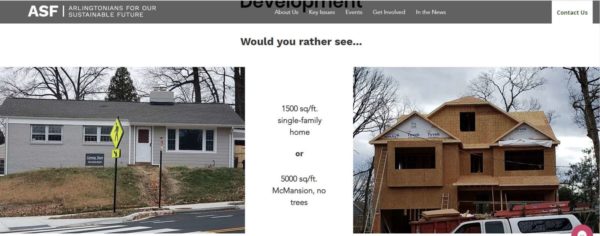 Making Room is a biweekly opinion column. The views expressed are solely the author’s.
Making Room is a biweekly opinion column. The views expressed are solely the author’s.
The McMansion is the universal punching bag for housing politics in Arlington.
It is a symbol for both pro-growth and anti-growth advocates of everything that is wrong with our land use and zoning policies.
For those who fear growth and decry upzoning, the McMansion is a threat to the suburban Arlington of yore, when a couple of middle-class public servants could afford a three-bedroom home on a tree-lined street. “Greedy developers” snatch up these modest bungalows and bulldoze them to make way for a monstrosity, leveling trees in the process.
For those who embrace growth and welcome upzoning, the McMansion is a failure to accommodate our growing population, allowing access to a single, affluent family, rather than allowing 2 or more families the same opportunity. Restricting density in popular neighborhoods limits our ability to create walkable urban places that are vibrant and full of opportunity for people at all income levels.
While I harbor no ill-will toward anyone who lives in a newly-constructed, 5,000 sq. ft. million+ dollar home, the prevalence of this type of dwelling signifies a failure of our housing market to meet the demand of our residents. If we conclude that McMansions are a symptom of a problem, perhaps we can agree on a solution.
In the first “research compendium” published as part of the Missing Middle study, Arlington County staff lay out the impact that single-family redevelopment has had on our housing supply.
Much of Arlington was developed in the 1930s through 1950s, which means many of our homes are older stock, roughly 1,500 square feet with 2 or 3 bedrooms. In just the past ten years, 8% of all of Arlington’s single-family detached homes have been either been torn down and replaced or substantially renovated. The newly-constructed replacement homes average 4,750 sq. ft. and cost an average of $1.7 million dollars.
Overall, Arlington County analysis shows that “the average sales price for a detached single-family house increased 45% between 2010 to 2019.”
With the increasing price of single-family homes, middle-class Arlington families have few opportunities to buy. At an average of $1.7 million dollars, a McMansion is only affordable to a family making $485,000 per year, which is more than three times the income of the average Arlington family of four.
McMansions are also outsized for the needs of most families. Data shows that the size of a typical household is decreasing, while the size of new homes continues to rise. In the last fifty years, the average square feet of living space per person has nearly doubled.
Thanks to new regulations for Accessory Dwelling Units (ADUs), some of these redeveloped homes can include basement or garage apartments. This has the benefit of offering a lower-priced rental opportunity for an additional household to live in a single-family neighborhood, while bringing in additional income for the homeowner. But these rules are limit size of the dwelling to under 1,000 sq. ft. and the number of occupants to 3 people.
McMansions are ubiquitous not because they are in higher demand than a smaller, lower-cost home, but because they are the best opportunity for return on investment, given high land costs and zoning limits. McMansions can be built by-right, meaning they are allowed in our zoning code without any special permission. Their size maximizes the sale price to recoup the cost of very expensive land. If you can only build one house on an expensive lot, you have an economic incentive to build the most expensive house you can.
The trend of teardown McMansions shows no signs of slowing, which means that every year, the average cost of single-family homes in Arlington increases and the options for middle-income families shrinks. Without a new approach, Arlington will be left with archipelago of large apartment buildings amidst a sea of giant, unaffordable homes.
It is easy to ridicule McMansions. It has become an American pastime. But it is worth investigating what flaws in our housing policies these homes expose and how we can develop solutions that will allow more diverse and equitable options to flourish in Arlington County.
Jane Fiegen Green, an Arlington resident since 2015, proudly rents an apartment in Pentagon City with her family. By day, she is the Membership Director for Food and Water Watch and by night she tries to navigate the Arlington Way. Opinions here are her own.


